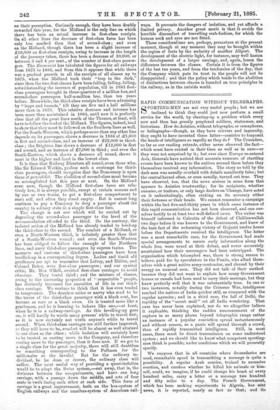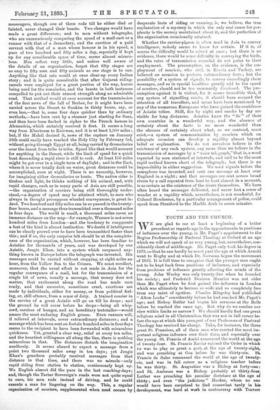RAPID COMMUNICATION WITHOUT TELEGRAPHS.
SPORTING-MEN are not very useful people ; but we are inclined to think they could just now perform a small service for the world, by clearing-up a problem which every now and then has greatly perplexed soldiers, statesmen, and historians. How do Asiatics, without telegraphs, or semaphores, or heliographs—though, as they have mirrors and ingenuity, they ought to have invented these latter—contrive to transmit the heads of intelligence so rapidly as they do P The Crusaders, so far as our reading extends, either never observed the fact— which must have existed in their time as well as in ours—or they were not surprised by it; but ever since Europe re-entered Asia, Generals have noticed that accurate rumours of startling events have been known to the natives around them before they themselves received any information. The story as told by the dark men was usually overlaid with details manifestly false; but the central kernel often, or even usually, turned out true. They have observed, too, that the news arrives in some form that appears to Asiatics trustworthy; for its recipients, whether enemies, or traitors, or only large dealers on 'Change, have acted on it unhesitatingly, often staking on its accuracy either their fortunes or their heads. We cannot remember a campaign within the last five-and-thirty years in which some instance of this rapid communication has not been observed, and can ourselves testify to at least two well-defined cases. The writer was himself informed in Calcutta of the defeat of Chillianwallah two days before it was known to the Government, and knew of the bare fact of the redeeming victory of Gujarat twelve hours before the Departments received the intelligence. The latter was a most remarkable case, for the Government had made special arrangements to secure early information along the whole line, were vexed at their defeat, and never accurately ascertained how their messengers had been outstripped. The organisation which triumphed was, there is strong reason to believe, paid for by speculators in the Funds, who allied themselves with a great native army-contractor, and cleared by their energy an unusual sum. They did not talk of their method because they did not want to explain how many Government horses or camels had been used to carry their message, but they knew perfectly well that it was substantially true. In one or two instances, notably during the Crimean War, intelligence reached the natives of India quicker still, as compared with the regular agencies ; and in a third case, the fall of Delhi, the rapidity of the " secret mail" set all India wondering. That case has never been explained, nor do we altogether believe it explicable, thinking the sudden announcement of the capture in so many places beyond telegraphic range rather an instance of a popular conviction spread instantaneously and without reason, as a panic will spread through a crowd,
than of rapidly transmitted intelligence. Still, in most cases, there must be direct transmission on some understood. system ; and we should like to knovi what competent sportingmen think is possible, under conditions which we will presently specify.
We suppose that in all countries where dromedaries are used, remarkable speed in transmitting a message is quite a possibility. A regular Arab courier, trained to excessive exertion, and careless whether he killed his animals or himself, could, we imagine, if he could change his beast at every hundred miles, carry a letter or a message two hundred and fifty miles in a day. The French Government, which has been making experiments in Algeria, has sent news, it is reported, nearly as fast as that; and its messengers, though one of them rode till he either died or fainted, never changed their beasts. Two changes would have made a great difference ; and to men without telegraphs, who are unconsciously comparing the speed of a mail-cart ora runner with that of a dromedary, and the exertion of a paid servant with that of a man whose honour is in his speed, a pace of two hundred and fifty miles a day, especially if kept np for any considerable space of time, seems almost miraculous. Men reflect very little, and unless well aware of the details of an organisation, forget that fifty stages are as easy to fifty men and fifty animals as one stage is to one. Anything like that rate would at once clear-up every Indian story; and it is quite conceivable that after Gujarat ridingcamels were employed fora great portion of the way, horses being used for the remainder, and the beasts in both instances compelled to put out their utmost strength along an admirable road. That method would at once account for the transmission of the first news of the fall of Berber, for it might have been carried across the Desert to Suakim in thirty hours, say, or even less,—that is, some four days quicker than by ordinary methods,—have been sent by a steamer just starting for Suez, and then have been flashed in cipher to the French houses in Alexandria, which certainly received it first. It seems a long way from Khartoum to Kalman, and it is at least 1,500 miles ; but, if the Mandi desired it, news of the capture on January 26th could easily have reached the Holy City by February 3rd, without going through Egypt at all, being carried by dromedaries over the desert from tribe to tribe. Speed like that would account for anything in the Desert, while the limit of speed for a quick boat descending a rapid river is still to seek. At least 150 miles might be got over in a 'single term of daylight ; and in the East, where it is never totally dark on water, great distances could be accomplished, even at night. There is no necessity, however, for imagining either dromedaries or boats. The native rider is tireless and light, he thinks nothing of his animal, and, with rapid changes, such as in many parts of Asia are still possible, —the organisation of couriers being still thoroughly understood,—a degree of speed may be attained which, to men who always in thought presuppose wheeled conveyances, is great indeed. Two hundred and fifty miles can be so passed in the twentyfour hours, and a message thus transmitted over a thousand miles in four days. The world is small, a thousand miles cover, an immense distance on the map—for example, Warsaw is not seven hundred miles from London—and .the tendency to exaggerate a feat of the kind is almost instinctive. We doubt if intelligence can be clearly proved ever to have been transmitted faster than this ; and if so, the only surprise felt should be at the completeness of the organisation, which, however, has been familiar to Asiatics for thousands of years, and was developed by one Asiatic, Jengiz Khan, into a system which surpassed anything known in Europe before the telegraph was invented. His messages could be carried without stopping, at eight miles an hour, from the Yellow Sea to the Crimea. We must recollect, moreover, that the usual effort is not made in Asia for the regular conveyance of a mail, but for the transmission of a single bit of news, usually a message, that money does not matter, that excitement along the road. has made men ready, and that excessive, sometimes cruel, exertions are made by individuals, either for money, or from political feeling, or, still oftener, from a sense of duty. A trained courier in the service of a great Asiatic will go on till he drops ; and the ground he will cover before he drops—being all whipcord, careless of hunger, and an hereditary teetotaller—would amaze the most enduring English groom. Even runners will, if relieved at intervals, cover extraordinary distances ; and a message which has been sent on foot six hundred miles in four days seems to the recipient to have been forwarded with miraculous quickness. Yet, granted a clear way, relief at every ten miles, and the heartiest willingness all along the line, there is nothing miraculous in that. The distances disturb the imagination needlessly. It seems absurd to expect a message from a point two thousand miles away in ten days ; yet Jengiz Khan's grandson probably received messages from that distance in that time, and there was no miracle—only rapid riding from station to station, continuously kept up. We English almost did the pace in the last coaching-days ; and, though the Tartar Sovereign's roads were not quite equal to ours, his men rode instead of driving, and he could execute a man for lingering on the way. This, a regular organisation of couriers, supplemented when need occurs by
desperate feats of riding or running, is, we believe, the true explanation of a mystery in which the only real cause for perplexity is the secrecy maintained about it, and the perfection of the organisation occasionally attained.
Whether the carrier-pigeon is often used in Asia to convey intelligence, nobody seems to know for certain. If it is, of course the difficulty would be solved at once ; but there is no evidence, there would be some difficulty in convey ing the birds, and the rates of transmission recorded do not point to their employment. The presumption, on the evidence, is the employment of couriers, who still, in Russia and Turkey, are believed on occasion to perform extraordinary feats ; but the possibility of a system of signals, to convey exceedingly short messages, and so in special localities greatly add to the speed of couriers, should not be too summarily dismissed. The presumption against it is violent, for it seems incredible that, if any system of signalling exists, it should have escaped the attention of all travellers, and never have been mentioned by auy of the numerous Europeans who have gained the confidence of Asiatic tribes. Still, fire by night and smoke by day aro visible for long distances. Asiatics know the " lie " of their own countries in a wonderful way, and the absence of certainty about the facts is no more wonderful than the absence of certainty about what, as we contend, must exist,—a system of communication by couriers which on adequate occasion can develop a rapidity almost beyond belief or explanation. We do not ourselves believe in the existence of any such system, any more than we believe in the transmission of messages by a " voice telegraph," that is, a word repeated by men stationed at intervals, and said to be the most rapid method known short of the telegraph ; but there is no impossibility in either suggestion. We used signals before the semaphore was invented, and sent one message at least over England in a night ; and that messages are sent across broad rivers by a call repeated from boat to boat almost in a moment, is as certain as the existence of the rivers themselves. We have often heard the messages delivered, and never lost a sense of wonder at a rapidity which, nevertheless, is not wonderful, for Colonel Henderson, by a particular arrangement of police, could speak from Stratford to the Marble Arch in seven minutes.



































 Previous page
Previous page